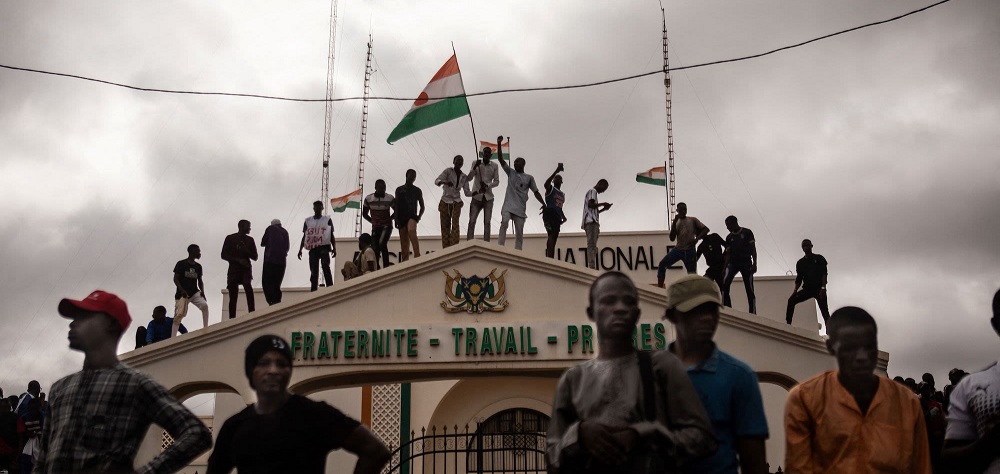Alwaght- The coup in Niger once again demonstrated the depth of the growing competition among the trans-regional powers seeking to expand influence in Africa in recent years. The developments of Niger, a poor and low-influence country in western Africa, have been making headlines since last week's military power grab, with various parties taking stances in favor of or against the coup leaders.
Meanwhile, one of the regional actors that over the past years has struggled for an active role in African developments, especially in the continent's instabilities including coups and military clashes in Tigray and Sudan, is the Israeli regime. Though now the Israelis have chosen silence on Niger coup, this African country is one of those with which Tel Aviv defined various interests, and for this reason, Israeli officials certainly watch the developments in it closely.
Using Nigeria to encourage normalization
One of the reasons why Tel Aviv cares about Niger developments is the country's potential to help push forward normalization with regional countries that has been in coma for years.
The first contacts between the two sides were established in 1960, the year Niger won its independence from the colonial France. At the time, the foreign policy of the Israeli regime was based on trying to establish relations with the newly independent poor African countries such as Ghana and Angola, so that in this way it could break the international isolation and Arab boycott and gain support in the United Nations. This policy is still not completely abandoned, and the Israelis use small and poor African countries to gain legitimacy on the international stage, as Israeli Foreign Minister Eli Cohen, recently said: "Establishing relations between Israel and Muslim countries in Africa is an action that benefits both sides. It helps both bilateral relations and regional stability.”
So far, Niger cut off its relations with the Israeli regime twice; one after 1973 Arab-Israeli war and they resumed ties after Tel Aviv agreement with the Palestinian Authority under Oslo Accords. But this did not last long and after the second Palestinian intifada in the early 2000s, Niger again severed its ties with the Israeli. Interestingly, Niger was the first country to cut off diplomatic relations with Tel Aviv after the second intifada and in protest at the Israeli atrocities against the Palestinians.
Despite this record of anti-Israeli positions of Niger, the pre-coup government led by President Mohamed Bazoum, who had pro-Western tendencies, was reported to have had behind-the-scenes pacts with the Israelis, and was one of new options of Tel Aviv for invitation to normalization. This was observed in post-coup Sudan. When the post-Omar al-Bashir government sought to restore relations with the West to tackle economic problems and lift the sanctions, one of the main US conditions for sanctions relief and giving a green light to the international institutions to help the crisis-hit Sudanese economic was normalization with Israeli regime. Khartoum was forced into normalization despite objection by public opinion.
The US and the Israeli regime are extremely worried about the strengthening of Russia-China-Iran axis in Africa, known as the continent of opportunities. The Israeli political and intelligence analysis and estimation is that the closer Niger gets to the anti-Western axis, the less likely it will join the normalization process.
In recent years, Russia has been trying hard to strengthen its influence in Africa. At the time of the coup, Putin hosted a conference in St. Petersburg with the presence of 17 heads of African countries and announced the free supply of grain to 6 friendly African countries to show that he cares about the challenges to African stability caused by the continuation of the war in Ukraine.
Iran and China, too, show great interest in this continent. Last month, Iranian President Seyyed Ibrahim Raisi made an Africa tour for the first time in a decade for an Iranian president, and the result of was 21 agreements with host countries. Also, Chinese foreign minister visited five African countries earlier this year as part of Beijing’s efforts to expand its global economic, political and military outreach.
The Niger coup follows a series of military coups that have taken place in African Sahel countries like Burkina Faso, Mali, and Sudan. In much of the coups and regional wars, Western and Israeli hands are observable. Still, Niger coup is one of the limited number of coups not plotted or backed by the Western countries and Tel Aviv.
Niger’s uranium reserves and West Asian nuclear ambitions
Niger ranks last in the human capital index and ranks first in the poverty index. Although it is one of the most underdeveloped countries in the world, having large and rich uranium reserves has given great importance to this country. This is why the Israelis that are the only holders of nuclear weapons in West Asia and North Africa security complex have special look at Niger’s uranium reserves.
Last year, Niger exported 5 percent of the world's total uranium production, but now, due to the European sanctions, Israelis are worried that the experience of selling Niger's uranium to rival countries will be repeated.
In the 1970s, Western countries and Tel Aviv accused Niger of regularly providing uranium to Libya and Iraq, including 258 tons in 1978 and also 1212 tons in 1981 to Libya and an unknown amount to Iraq in the period before the Israeli air strike on Iraqi nuclear reactor on June 1, 1981.
Now in West Asia, in addition to Iran that seeks peaceful use of nuclear energy, other countries like the UAE and Turkey, and even Saudi Arabia, are increasingly moving towards nuclear energy in alarm to the Israelis who are afraid about losing their nuclear monopoly in the region. Despite being close friends to the Saudi and Emirati rulers, the Israelis are strongly opposed to these countries’ nuclear ambitions and are worried about their access to Niger's uranium reserves.



























